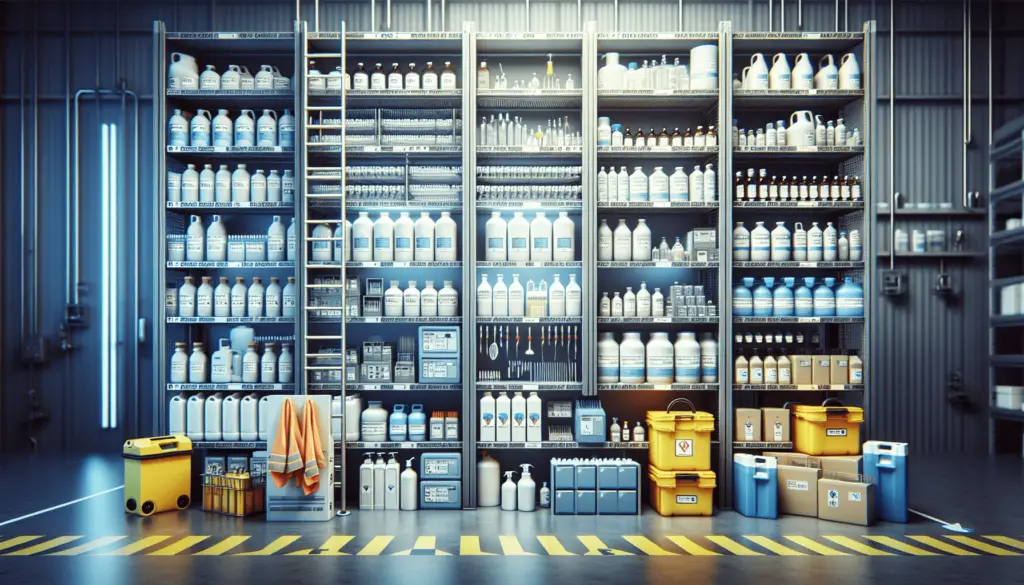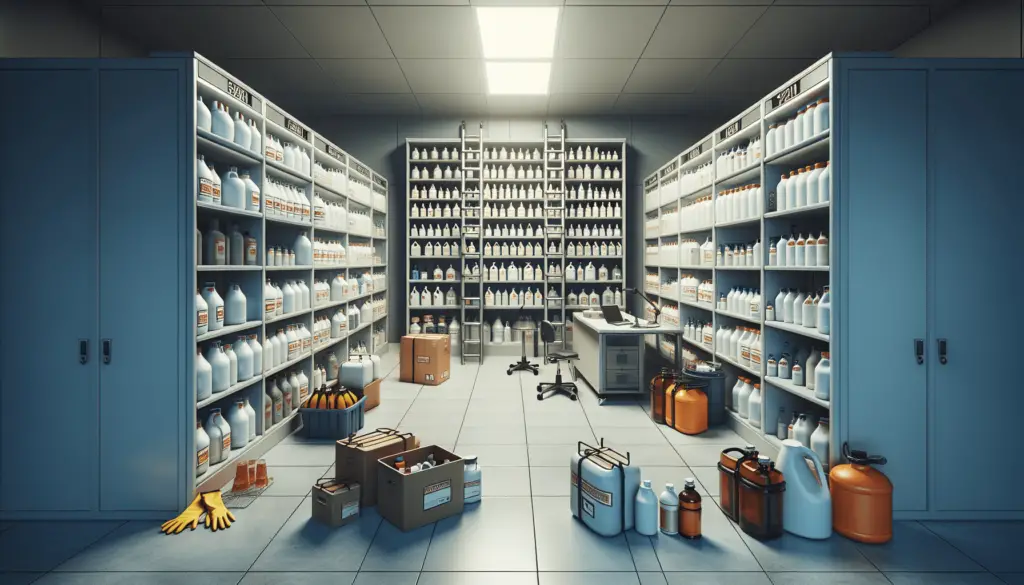Hello there! Today, I will guide you on how to safely handle and store chemicals for prepping. It is important to follow proper guidelines to ensure your safety and the safety of those around you. By taking these precautions, you can be confident in your prepping activities and minimize the risks associated with handling chemicals. Let’s dive in and learn how to handle and store chemicals properly! Have you ever wondered how to safely handle and store chemicals for prepping? Whether you are preparing for an emergency situation or conducting experiments at home, it is crucial to understand the proper procedures for handling and storing chemicals. This comprehensive guide will provide you with all the information you need to safely work with chemicals and keep yourself and others safe.
Importance of Proper Chemical Handling and Storage
Handling and storing chemicals properly is essential for several reasons. Not only does it protect you and others from potential harm, but it also ensures the effectiveness and longevity of the chemicals you are working with. By following proper procedures, you can prevent accidents, spills, and contamination, ultimately creating a safe environment for yourself and those around you.
Protecting Yourself and Others
When working with chemicals, it is crucial to protect yourself and others from potential hazards. This includes wearing the appropriate personal protective equipment (PPE), such as gloves, goggles, and lab coats, to prevent contact with skin, eyes, and clothing. Additionally, proper ventilation is essential to avoid inhaling harmful fumes or gases that may be released when handling chemicals.
Ensuring Effectiveness of Chemicals
Proper handling and storage of chemicals also help maintain their effectiveness and stability. Exposure to air, light, moisture, or extreme temperatures can degrade chemicals and render them ineffective. By storing chemicals correctly and following recommended procedures, you can ensure that they remain potent and reliable for their intended use.
Safety Precautions for Chemical Handling
Before you start working with any chemicals, it is important to familiarize yourself with the specific safety precautions for each substance. Every chemical has unique properties, hazards, and safe handling guidelines that you need to be aware of to prevent accidents and injuries. Here are some general safety precautions to keep in mind when handling chemicals:
| Safety Precautions | Description |
|---|---|
| Wear PPE | Always wear the necessary personal protective equipment (PPE), including gloves, goggles, and lab coats, to protect yourself from chemical exposure. |
| Read Labels | Read and follow the instructions on the chemical labels carefully. Pay attention to hazard warnings, recommended storage conditions, and proper handling procedures. |
| Avoid Skin Contact | Minimize skin contact with chemicals by wearing gloves and long sleeves. In case of accidental skin exposure, rinse with water immediately and seek medical attention if necessary. |
| Handle with Care | Handle chemicals with caution and avoid any unnecessary risks or actions that could lead to spills, splashes, or accidents. Always use the appropriate tools and equipment for handling chemicals. |
| Store Properly | Store chemicals in designated areas that meet the recommended storage conditions, such as temperature, humidity, and ventilation requirements. Keep incompatible substances separate to prevent reactions. |
Remember to always refer to the safety data sheets (SDS) provided by the manufacturer for detailed information about the hazards, handling procedures, and emergency response measures for each chemical you are working with.

Guidelines for Chemical Storage
Proper storage of chemicals is just as important as safe handling to prevent accidents, spills, and contamination. By following guidelines for chemical storage, you can maintain a safe and organized work environment while protecting the integrity of the substances you are storing. Here are some essential guidelines to consider when storing chemicals:
Storage Location
The location where you store chemicals should be well-ventilated, dry, and away from direct sunlight and extreme temperatures. Avoid storing chemicals near heat sources, flames, or ignition hazards to minimize the risk of fire or explosions. Additionally, designate a specific area or cabinet for chemical storage to prevent cross-contamination with other materials.
Storage Containers
Use appropriate containers for storing chemicals based on their compatibility and properties. Glass, plastic, or metal containers may be suitable for different types of chemicals, so make sure to choose the right material that can safely contain the substance without reacting or deteriorating. Label all containers with the chemical name, date of receipt, and any other pertinent information to ensure proper identification.
Segregation and Compatibility
Separate chemicals based on their compatibility and potential for reaction with other substances. Incompatible chemicals should be stored apart to prevent accidental mixing and reactions that could result in dangerous fumes, heat, or explosions. Refer to compatibility charts or guidelines provided by the manufacturer to determine the proper storage arrangement for different chemicals.
Emergency Preparedness
Always be prepared for emergencies by having spill containment supplies, first aid kits, and emergency response equipment readily available near your chemical storage area. In the event of a spill, leak, or accident, you should know the proper procedures for containment, cleanup, and disposal to minimize the impact and prevent further harm to yourself and the environment.
Security and Access Control
To prevent unauthorized access and ensure the security of your chemical storage area, consider implementing access controls, such as locked cabinets or restricted entry. Keep an inventory of all chemicals stored, including quantities, expiration dates, and potential hazards, to track usage and maintenance of your chemical inventory effectively.
By following these guidelines for chemical storage, you can create a safe and organized environment that promotes efficient and secure handling of chemicals while minimizing risks and hazards.
Common Types of Chemicals for Prepping
When it comes to prepping for emergencies or survival situations, there are several types of chemicals that can be useful for various purposes, such as cleaning, disinfecting, water purification, and first aid. Knowing how to safely handle and store these chemicals is essential for preparing for unexpected events and ensuring your safety and well-being. Here are some common types of chemicals used for prepping:
| Chemical Type | Description |
|---|---|
| Bleach | Used for disinfecting, water purification, and cleaning. |
| Hydrogen Peroxide | Antiseptic, disinfectant, and wound cleaning agent. |
| Isopropyl Alcohol | Disinfectant, solvent, and antiseptic for first aid. |
| Vinegar | Natural cleaner, disinfectant, and deodorizer. |
Each of these chemicals has specific properties and uses that require proper handling and storage to ensure their effectiveness and safety. By understanding how to work with these common chemicals for prepping, you can be better prepared for emergencies and have the necessary supplies on hand to respond effectively.

Safety Tips for Specific Chemicals
Different chemicals require specific safety precautions and handling procedures based on their properties, hazards, and intended uses. To help you navigate the unique requirements of each chemical, here are some safety tips for handling and storing commonly used chemicals for prepping:
Bleach
- Always dilute bleach according to the manufacturer’s instructions before using it for disinfection or cleaning purposes.
- Do not mix bleach with other cleaning products, such as ammonia or vinegar, as it can produce toxic fumes.
- Store bleach in a cool, dry place away from sunlight and heat sources to maintain its effectiveness and stability.
Hydrogen Peroxide
- Use hydrogen peroxide as a disinfectant for wounds or surfaces by applying it directly or diluting it with water.
- Keep hydrogen peroxide in a dark-colored bottle or container to prevent degradation from light exposure.
- Store hydrogen peroxide at room temperature and avoid contact with metals, as it can cause discoloration or chemical reactions.
Isopropyl Alcohol
- Use isopropyl alcohol as a disinfectant for first aid, surface cleaning, and electronics by applying it directly or with a cloth.
- Store isopropyl alcohol in a well-ventilated area away from heat, flames, or ignition sources to prevent fire hazards.
- Keep isopropyl alcohol containers tightly closed when not in use to avoid evaporation and contamination.
Vinegar
- Use vinegar as a natural cleaner, disinfectant, or deodorizer for various household purposes.
- Store vinegar in a cool, dark place to maintain its potency and prevent changes in acidity or flavor.
- Avoid mixing vinegar with bleach or hydrogen peroxide, as it can produce harmful gases or chemicals that are toxic when inhaled.
By following these safety tips for handling specific chemicals, you can effectively use them for prepping while minimizing risks, accidents, and exposure to hazardous materials.
Conclusion
In conclusion, knowing how to safely handle and store chemicals for prepping is essential for your safety, well-being, and emergency preparedness. By following proper procedures, safety precautions, and guidelines for chemical handling and storage, you can create a secure environment that minimizes risks, accidents, and potential hazards associated with working with chemicals. Whether you are preparing for emergencies or conducting experiments at home, being informed and proactive about chemical safety is key to ensuring a safe and productive experience. Remember to always prioritize safety, read labels, follow instructions, and seek guidance when handling unfamiliar chemicals to prevent accidents and protect yourself and others. Stay safe and prepared for anything by incorporating these tips and practices into your chemical handling and storage routines.
